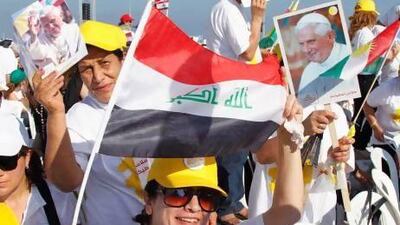BEIRUT // Standing in front of thousands of worshippers during an open-air mass along Beirut's waterfront last September, Pope Benedict XVI urged people across the region to work towards peace.
Yesterday, following the news of his surprise resignation, some who saw him during his visit to Lebanon - his last official foreign trip - expressed hope that this message would be carried on after he steps down as head of the Roman Catholic Church at the end of the month.
Upon his arrival in Lebanon last year, Pope Benedict described himself as a "pilgrim of peace".
"May God grant to your country, to Syria and to the Middle East the gift of peaceful hearts, the silencing of weapons and the cessation of all violence," he said during his three-day visit, in sentiments that resonated beyond Beirut and across the Arab world.
Father Nagi Edelby, a professor in the religious studies department at Beirut's St Joseph's University, said yesterday that while the 85-year-old pontiff had appeared weary during his visit, his message remained clear.
"When I saw him he seemed a bit tired, but on the other hand he had a very clear mind," he said. "When I heard [about the resignation], it wasn't so strange because I can imagine such a rational person like him taking such a decision ... The memory of his visit to Lebanon is a very deep one and people won't forget easily these three days that he was in our land."
Fr Abdo Abou Kassm, director of the Catholic Information Centre in Beirut, described the Pope as an "honourable man" whose visit was "very special" to Christians in Lebanon and beyond.
Among the issues raised by the German-born pontiff during his visit was the need for more cooperation between faiths including Muslims and Christians, as well as the delicate subject of how to encourage Arab Christians to remain in the region where their religion was born. There are currently an estimated 13 million Christians across the Arab world, but many others have left over the years for reasons including conflict, fears of persecution and poor economic conditions.
Among the thousands who turned out to greet the Pope during his visit in September was Rony Khoury, 44, who said he was proud that he, his wife and three children caught a glimpse of Pope Benedict.
"I was so happy that he came to take care of the Christians here. It is very special when Christian leaders visit us in the Middle East," he said. "But, maybe a younger pope will continue to help the Christians of the Middle East to stay and support us."
While there was a general feeling of shock yesterday, some said it was too early to tell how the papal resignation could affect Arab Christians.
"The Pope wanted Christians to be safe, especially with everything happening in the Arab world, in Egypt and Syria," said Michel Sfeir, an 82-year-old who runs an antiques shop in Beirut. "It's a very difficult time."
Similar expressions of surprise were made elsewhere across the Arab world.
"We knew the Pope was not in good health, but we never expected he would resign," said William Shomali, Auxiliary Bishop to the Latin Patriarchate of Jerusalem.
"But we greet his humility and courage. Humility because he recognises his limits in terms of his health. After six centuries, this is the first pope to resign for such reasons. We need this courage to use as a model for other religious leaders and politicians to consider for their work."
Some, including Faris Aridah, a Catholic priest and principal of the Ahlia primary and secondary school in Ramallah, voiced concern about whether Pope Benedict's efforts to support Christians in the Middle East would be continued by his successor.
"Pope Benedict was beginning to unify Christians and he was a supporter of human rights, including Palestinian rights," he said. "We need the Pope now more than ever because we are in a bad situation. The unity of the Church is with the Pope; he's the pillar of that unity. But we are facing so many problems in Syria, the region, the whole world, and we need someone who speaks with a loud voice."
Marissa Nicolina, a 63-year-old from Genoa, Italy, who was making a pilgrimage to Jerusalem with her husband and daughter, described Pope Benedict as someone who worked "hard for humanity".
"There are so many problems in the world, and so many people are straying from religion," she said, standing outside Jerusalem's Church of the Holy Sepulchre.
"We need strong leadership to keep religion meaningful to people."
* With additional reporting by Hugh Naylor
twitter: For breaking news from the Gulf, the Middle East and around the globe follow The National World. Follow us

